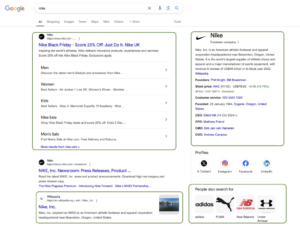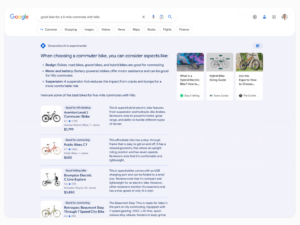As we look ahead to 2025 and beyond, the B2B SEO landscape is evolving rapidly due to the advancement of new technologies and user behaviour. Businesses need to understand and adapt as quickly as possible to the latest SEO trends if they want to stay competitive, maintain top organic rankings and convert visitors into leads.
In this article, we’ll explore five top trends and predictions that will shape the future of B2B SEO. By staying ahead of these trends, companies can position themselves as industry leaders and maximise their organic visibility in an evolving competitive search environment.
1 – AI Search Generative Experience (SGE)
Since AI overviews increasingly occupy a significant amount of space, they can push organic results down, especially when users click on the “Show more” button. Understanding this dynamic can help you achieve a more prominent positioning in search results.
With large language models (LLMs) attracting more visits each month. According to recent reports, “ChatGPT reached over 100 million monthly active users by the beginning of 2024.” Companies should pay special attention to these new audience growth opportunities presented by tools such as ChatGPT, Gemini and other LLMs.
Before we get started, I should clarify that I’m not covering brand visibility in LLMs in this article. There’s a fundamental difference between the AI overviews and LLMs regarding the user journey – so I will address this topic with a dedicated article in the future.
What are AI Overviews?
AI overviews are AI content-generated summaries with key information and links for further exploration, based on your search query, similar to what Google has introduced as Rich snippets (also known as “rich results”). For Google specifically, it is called Search Generative Experience or “SGE”.
This new Google feature is displayed above each traditional organic result and can appear before or after paid ads, depending on the specific query. Example:
How can you improve your brand visibility on Google’s SGE?
According to Google Search Central, you only need to follow the guidelines outlined in their Search Essentials for your site to be considered for inclusion in AI Overviews. Let’s explore methods and tactics that can help you improve your brand’s visibility on this new channel.
- Ensure accessibility for LLM crawlers: Make sure your site is accessible to the crawlers used by ChatGPT, Gemini, Copilot and Perplexity and so on. Enable crawler access with a correctly configured robots.txt file and regularly update your XML sitemaps to make all relevant content easily detectable.
- High-quality, authoritative content: With LLMs, the quality of content has become more important than ever. High-quality content must add value to the reader by offering insightful, accurate and comprehensive information. It’s not just about filling pages with text, it’s about providing meaningful content that meets the needs and expectations of your audience.
- Structure of the content: Organising the content in a “Question and Answer” format can increase its probability for Featured snippets. Additionally, using lists, tables, and bullet points can enhance your content’s appeal for this rich result. The key is to provide clear, easily digestible information that directly addresses user inquiries
- Optimise for semantic search: Focus on topic modelling and semantic SEO. Create content groups (Content Pillars) that cover broad topics comprehensively, linking related articles to establish authority on a subject.
- User experience (UX): Make sure your site is mobile-friendly, loads quickly and offers a seamless user experience. Google considers page experience in its rankings, which will probably influence how Gemini prioritises content.
2 – Topical Authority
Topic authority is a method of measuring your brand’s expertise on a topic directly related to your core business. Creating a topic authority strategy is key to bringing credibility and trust to your company and, at the same time, gaining top positions on Google.
Why is topical authority important for SEO?
From the launch of E-A-T (Experience, Authoritativeness, and Trustworthiness) in 2019 to its expansion to E-E-A-T (adding the extra E for Trustworthiness) in 2022, Google prioritises the top positions for sites that have authority and expertise in the subject and that generate reliable, quality information for readers.
To ensure that your domain fulfils the requirements, you need to adopt strategies that focus on building authority on subjects directly related to your business. One such strategy is topical authority, which has become extremely necessary – this SEO concept creates a chain of relevant content that shows the reader and the Search engine the brand’s expertise in its area of activity.
3 – Focus on the User’s Search Intent
Search Intent, also referred to as “User Intent”, is the primary goal a user aims to achieve when entering a query into a search engine. Common types of Search Intent include informational, commercial, navigational, and transactional. For instance, someone searching for “best Android phones” is likely looking to compare different options.
Why is search intent important in SEO?
In simple terms, meeting Search Intent is Google’s top priority. Google prioritizes relevance in its search results, so to rank well, your content must be the most relevant answer to a query. This begins with creating content that aligns with the search intent of your target audience.
How to identify and optimise for search intent
SEOs typically categorize keywords into one of four search intent buckets:
- Informational intent — Users are seeking information or answers to specific questions.
- Commercial intent — Users are comparing products or services as they prepare to make a purchase decision.
- Transactional intent — Users are ready to take action, often making a purchase.
- Navigational intent — Users are searching for a specific website.
These broad categories of search intent serve as a valuable starting point for shaping your content strategy. For instance, when creating blog content, filtering for informational intent keywords in your SEO tool (SEMrush or ahrefs) can help you quickly identify relevant topics.
Additionally, the SERPs provide valuable insights into what searchers truly want. You can discover:
- Do they prefer a blog post or a video?
- Are they looking for a list of top options or a single recommendation with a review?
- Do they prioritize specific factors when seeking recommendations?
In this way you’ll be able to classify intent, helping you target keywords more effectively.
4 – Brand authority
As a business, standing out isn’t just about offering a fantastic product or service — it’s about being recognised as the go-to expert in your field. Brand authority is the trust and respect your brand earns from your audience. When people view your brand as a knowledgeable leader, they are more likely to choose you over the competition, remain loyal in the long run, and recommend you to others.
Why is brand authority important for SEO?
Search engines need to reflect the real world, and brands are a significant part of that landscape. Searchers expect to find familiar brands, even when those websites aren’t perfectly optimised or lack the highest Domain Authority.
Furthermore, Google rewards brands in various ways, including expanded listings (such as sitelinks), Knowledge Graph (entity) results, duplicate rankings on the first page, and a greater likelihood of certain types of rich results.
Over the past decade, there has been a significant shift in the diversity and presence of SERP features in search results. It’s not just that Nike is ranking number one organically; Nike, along with various brands—many of which are medium-sized or smaller—are receiving enhanced brand signals through SERP features such as sitelinks and knowledge panels. Example:

How can I leverage my company’s brand authority?
- Connect with local media outlets to enhance your presence: A practical and strategic approach to building brand authority is to connect with journalists and collaborate with local influencers who have a broad sphere of influence. They can help share your brand’s story and penetrate the local market with their established credibility and follower base.
- Produce insightful content that is unique to your brand: Content is king, as the saying goes. However, it’s also expected that anyone can quickly generate content by consulting numerous online resources or repurposing existing material. So how can you stand out among a sea of content creators? By producing valuable content that is unique to your brand and difficult for others to replicate.
- Utilise a range of social media campaigns to expand your reach: Social media offers a valuable opportunity for brands to optimise their potential. Campaigns on these platforms are crucial for promoting products and services. Keep an eye on trending topics and find ways to create innovative campaigns around them, using holidays, festivals, and popular events as a solid foundation.
- Builds trust, loyalty, and credibility: Testimonials are highly valuable for establishing brand authority. Each testimonial or online review offers an opportunity to inform your audience about the quality of service you provide. They also allow potential customers to explore the products or services you offer and understand the impact you have on your clientele.
5 – Conversion Rate Optimisation (CRO)
Conversion rate optimisation (CRO) is the process of increasing the percentage of visitors who take a desired action on your website. This can include actions such as purchasing a product, signing up for a webinar, engaging with live chat, or enrolling in a course upsell.
Why is conversion rate optimisation important for SEO?
Higher conversion rates typically lead to increased revenue, which is a clear advantage. Additionally, it’s an effective strategy for lowering your customer acquisition costs (CAC) and enhancing your ROI.
Today, with the growing number of websites and the ongoing evolution of consumer behaviour, CRO has become an essential part of any successful digital marketing strategy. It enables businesses to make data-driven decisions, enhancing user experience, boosting customer satisfaction, and ultimately driving more conversions.
www.accuracast.com (Article Sourced Website)
#Top #Trends #B2B #SEO #AccuraCast

